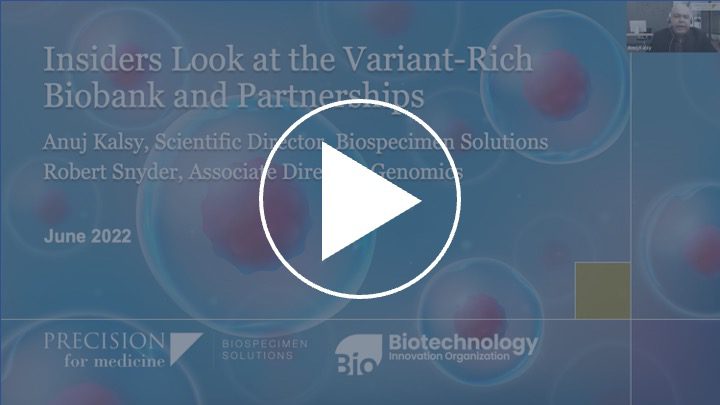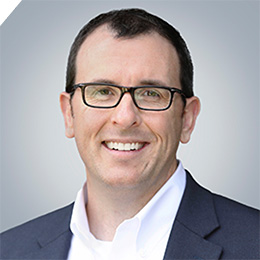Variant Rich Biobank & Partnerships
A BIO International and Precision for Medicine Webinar

Anuj Kalsy
Scientific Director Precision for Medicine

Robert Snyder, PhD
Associate Director, Genomics Precision for Medicine
At BIO International Convention 2022, Precision for Medicine® hosted a talk called Insider's Look at the Variant-Rich Biobank and Partnerships. Precision for Medicine is a global CRO that supports biomarker-based R&D activities from bench to market, supplying biospecimens, lab services, and clinical trial solutions to the life sciences community.
Anuj Kalsy, Scientific Director, Precision Biospecimen Solutions and Robert Snyder, PhD, Associate Director of Genomics at Precision for Medicine discussed how Precision partners with the scientific community to support preclinical and clinical research that accelerates the advancement of precision medicine.
Anuj highlighted to the audience during the talk that drug development remains an expensive and unpredictable undertaking, with an estimated cost of $2.6 billion for a single new drug.1 Even with all the measures taken to mitigate risk throughout the development process, 90% of drug candidates in clinical trials fail. Many such failures are attributed to scientific reproducibility. In a 2016 Nature survey, more than 70% of researchers reported trying and failing to reproduce another scientist's experiments.2 This finding was confirmed in a later survey in which 9 out of 10 researchers emphasized the problem of poor reproducibility.3 To solve the issue of scientific reproducibility, the research community demands that high-quality biobanks deliver fit-for-purpose specimens.
To address the above scientific problems, Anuj Kalsy showcased solutions by pointing out that Precision for Medicine is a global leader in supplying diverse, high-quality, IRB-approved, clinically-annotated, ready-to-ship human biospecimens, including blood, biofluids, tissues, viable cells, and custom collections. Precision for Medicine has biorepositories containing over 30 million deeply characterized biospecimens, as well as 7 laboratories across North American and Europe processing millions of samples per day. Precision for Medicine also has robust custom collection capabilities, with a clinical network spanning more than 150 investigator sites, 90 therapeutic areas, 25 countries, and 500 actively enrolling studies.

Robert Snyder discussed details on one of the more interesting aspects of the biorepository: the Precision Oncology Sequencing Initiative (Project P.O.S.I.), a large-scale, two-phase next generation sequencing (NGS) initiative. Phase 1 of Project P.O.S.I., focuses on screening formalin-fixed, paraffin-embedded (FFPE) blocks across 12 cancer indications. Precision is currently screening at a rate of approximately 800 samples per month, with a plan to ramp up to 1,600 samples per month. Within Phase 1 there are multiple projects including:
- A precision screening project using a targeted 50-gene panel that screens for single nucleotide variants (SNVs), indels, fusions, and amplifications. More than 7000 FFPE samples have been characterized so far with this panel across 11 indications.
- A pan-cancer screening project using a 500+ gene panel that screens for tumor mutational burden (TMB), microsatellite instability (MSI), SNVs, indels, fusions, and amplifications for verification, validation, and generation of orthogonal data to support regulatory submissions. By the end of 2022, Precision for Medicine expects to have sequenced samples across 12 cancer indications (see Figure 2)
Project P.O.S.I. is supported by Precision for Medicine's robust and expanding genomics and molecular laboratory infrastructure (see Figure 2). This screening infrastructure was purposefully designed to be platform and assay agnostic, allowing the data to speak for itself and enabling unbiased head-to-head comparisons.
Figure 2. Anticipated breakdown of sample indications for pan-cancer screening

Phase 2 of Project P.O.S.I. involves ongoing prospective collections for liquid biopsy assays. Approximately 350 donors are enrolled so far across a range of cancer indications. These donors are screened with both tissue-based and plasma-based assays, creating a biorepository and database of matched tissue-plasma samples. In addition, the donors are re-enrolled at multiple time points so longitudinal genetic profiles are available.
Project P.O.S.I. is supported by Precision for Medicine's robust and expanding genomics and molecular labs infrastructure (see Figure 3). This screening infrastructure was purposefully designed to be platform and assay agnostic, allowing the data to stand alone and enabling objective head-to-head comparisons.
Figure 3. Advanced equipment and assays supporting Project P.O.S.I.

Dr. Snyder shared a personal experience from his previous work in companion diagnostics (CDx) product development and reinforced that the biggest bottleneck, particularly when running accuracy assays, is samples.
Partnerships with CDx developers have been instrumental to Precision for Medicine's success in creating a library of deeply-phenotyped, data-rich samples that researchers can leverage to support preclinical and clinical development. CDx developers in need of samples and data provide kits to Precision for Medicine who, in turn, provides high-quality biospecimens, specialty lab capabilities, and the data analysis expertise necessary to extract meaningful, actionable insights. Precision for Medicine also supports CDX development through inter-laboratory reproducibility, validation kit assembly, and prospective collections for matched tissue types, minimal residual disease, and clinical trial enrollment.
To learn more about how Precision for Medicine accelerates the advancement of precision medicine, watch the full talk here.
1 Policy & Medicine. A Tough Road: Cost To Develop One New Drug Is $2.6 Billion; Approval Rate for Drugs Entering Clinical Development is Less Than 12%, March 21, 2019.
2 Baker, M. 1,500 scientists lift the lid on reproducibility. Nature. 2016;533:452-454.
3 Checklists work to improve science. Nature. 2018;556(7701):273-274.

